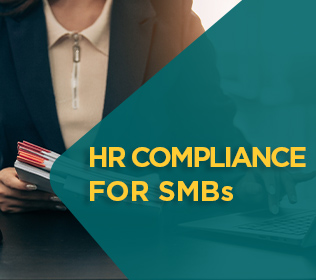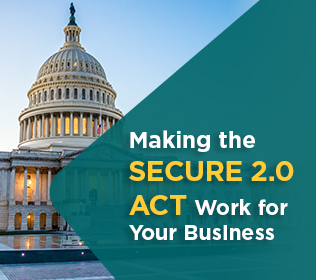
Retirement plans come in all shapes and sizes, and your employees are looking for the best option for themselves and their families.
Day in and day out, we discuss strategies to retain the employees you love. Those employees who make the most significant impact are the most productive and best to work with. Of course, you have to think about more than just retaining your best employees – you also need to have competitive employee benefits to attract new, top talent. In this competitive job market salary is always a huge factor, but salary alone is not enough. Successful companies offer fortune 500 benefits to further entice talented candidates to accept their offer.
The standard employee benefits include medical, dental, and vision, but as these are expected in most competitive job offers, they may not be enough to seal the deal. If you offer robust retirement savings plan options, that could be the edge you need to draw in new employees and keep your best talent in-house. By providing retirement savings to your staff, you show that your company cares about their future. It also shows that you want them to focus on their tasks, rather than worrying about what’s to come. These plans can eliminate the anxiety about an employee’s next stage in life.
Just as there are many options when offering generous employee benefits, there are options when considering retirement savings plans. There are employer-sponsored plans, and these are very desirable to employees. These work by allowing the employee to contribute to their savings account and the employer sets up a match program or a certain amount to contribute. There are also non-employer-sponsored plans that are offered to employees without a contribution from their employer.
PrestigePEO is well versed in the many retirement options you can provide to your team. Below is a brief guide to the different types of retirement plans you can offer.
Employer-Sponsored Retirement Plans
401(k)
The most widely offered retirement savings program is the standard 401(k). This is an employer-sponsored plan that both the company and the employee can contribute to.
Benefits to the employer:
- Employer contributions are deductible on the employer’s federal income tax return to the extent that the contributions do not exceed the limitations.
Benefits to the employee:
- Elective deferrals and investment gains are not currently taxed and enjoy tax deferral until distribution.
Roth 401(k)
While this plan is like the standard 401(k), the tax withholdings vary and there is a minimum age of 72 for withdrawal. Contributions made to Roth 401(k) accounts are taxed, but earnings and withdrawals made after retirement are tax-free.
Benefits to the employer:
- Employer contributions are deductible on the employer’s federal income tax return to the extent that the contributions do not exceed the limitations.
Benefits to the employee:
- Any money put into a Roth 401(k) grows tax-free, and there are tax-free withdrawals at retirement.
403(b)
A 403(b) plan (tax-sheltered annuity plan or TSA) is a retirement plan offered by certain charities. Just as with a 401(k) plan, a 403(b) plan lets employees defer some of their salary into individual accounts.
Benefits to the employer:
- Employer contributions are deductible on the employer’s federal income tax return to the extent that the contributions do not exceed the limitations.
Benefits to the employee:
- Offers flexibility in contributions and optional loans and hardship distributions add flexibility for employees.
Non-Sponsored Retirement Plan Options
The benefits to employees on the plan below vary on investment and goals. Obviously, employers have zero contribution to this plan, but there are some companies that still provide easy access to registering, despite not offering a match or the like.
Traditional individual retirement accounts (IRAs)
Individual Retirement Arrangements (IRAs) allow you to make tax-deferred investments to provide financial security when you retire.
Benefits to the employee:
- Contributions may be fully or partially tax-deductible.
Payroll Deduction IRA
With this type of IRA, a business of any size, or even someone who is self-employed, can set up an IRA with a financial institution and authorize a payroll deduction.
Benefits to the employee:
- Employee contributions may be eligible for the Saver’s Credit.
There are many options for offering retirement savings plans to your employees. Employer-sponsored retirement plans can be beneficial for more than one reason – not only do employees prefer retirement plans with an employer match, but you can also deduct your contributions from your taxes. Generally speaking, it’s a win-win situation. Are you feeling overwhelmed by all these options or unsure how much of an employer match you should offer? The retirement plan experts at PrestigePEO know these plans inside and out and provide thorough advice to all our clients. Get in touch today to learn more about our retirement plan options and many other services!




